|
|
|
Sort Order |
|
|
|
Items / Page
|
|
|
|
|
|
|
| Srl | Item |
| 1 |
ID:
103217
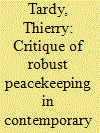

|
|
|
|
|
| Publication |
2011.
|
| Summary/Abstract |
The concept of robust peacekeeping emerged in response to the failures of the UN in Rwanda and Bosnia and Herzegovina, where peacekeepers were passive witnesses of massive violations to human rights, allegedly because they were not 'robust enough'. Although robust peacekeeping is not a new concept and has been partially implemented in some operations (Sierra Leone, Democratic Republic of Congo, Haiti, Lebanon), it attracted renewed attention in 2008-10 with developments in its conceptualization. While it recognizes the necessity and virtue of a robust approach as a protection mechanism for peacekeepers, this article questions the extent to which robust peacekeeping is politically acceptable and operationally viable. Beyond the doctrinal difficulty of ensuring compatibility of robustness with the principles of peace operations, robust peacekeeping is directly challenged by the perennial constraints of contemporary peace operations, such as weak political support, the erratic availability and quality of troops, and the reticence of troop contributors to embrace a robust approach. Overall, while robustness is presented as a solution to the 'credibility gap' that the UN faces, its relevance in the light of these problems is dubious.
|
|
|
|
|
|
|
|
|
|
|
|
|
|
|
|
| 2 |
ID:
190787
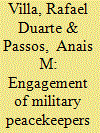

|
|
|
|
|
| Summary/Abstract |
Peacekeepers are seen as a UN tool for promoting domestic changes in host countries, but little is known about the political consequences when officers return home. During the last 10 years, Brazilian presidents appointed a significant number of former peacekeepers to key political functions. How and why do former peacekeepers end up so involved in government affairs? To answer this question, this paper focuses on the array of skills acquired by peacekeepers in domestic missions and reinforced abroad. Drawing on a set of semi-structured interviews and questionnaires to military, former political decision-makers, and researchers, as well as other primary and secondary sources, this paper details how political articulation, experience in conflict management, and prestige empowered Brazilian military officers to resume their tradition of intervention in politics. This paper also shows that peace operations can produce deleterious outcomes for troop-contributing countries in the Global South.
|
|
|
|
|
|
|
|
|
|
|
|
|
|
|
|
| 3 |
ID:
186080
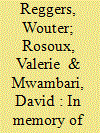

|
|
|
|
|
| Summary/Abstract |
This article explores the interactions between the memories of Belgian peacekeepers killed in the 1994 genocide in Rwanda, the weight of the colonial past, and the Belgian foreign policy. Using interviews with Belgian politicians and diplomats, families of peacekeepers, former blue helmets, as well as a corpus of official speeches, this article finds that the memorialization of blue helmets has influenced Belgian political choices on three levels, namely: domestic politics, its bilateral relationship with Rwanda, and more broadly its position in international peacekeeping. In doing so, this article contributes to interdisciplinary debates on the role of collective memory in domestic and international politics.
|
|
|
|
|
|
|
|
|
|
|
|
|
|
|
|
| 4 |
ID:
186626
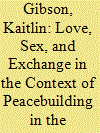

|
|
|
|
|
| Summary/Abstract |
The narrow framing of Sexual Exploitation and Abuse (SEA) and the United Nations Zero-Tolerance Policy inadequately accounts for the range of sexual interactions in peacekeeping contexts and obscures the wider social contexts within which sexual decision making occurs. We draw on personal narratives from women who have had such sexual interactions, as well as community observers to demonstrate the complexity, multiple forms and ambiguities that characterize these relationships. We focus particularly on ‘love’ and long-term relationships. The complexities revealed cast doubt on the efficacy and appropriateness of the UN’s zero-tolerance policy and call for a modification of the concept of the peacekeeping economy to include consideration of intimacy, emotion and quests to fulfil expectations of gendered social roles in the contradictory landscape of peacekeeping.
|
|
|
|
|
|
|
|
|
|
|
|
|
|
|
|
| 5 |
ID:
160216
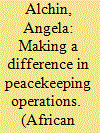

|
|
|
|
|
| Summary/Abstract |
Recruiting more women into peacekeeping operations due to the perceived unique contributions they are said to make to missions has been widely advocated by the United Nations (UN) and other agencies as a means to overcome the unintended consequents of deployments – mainly the ongoing reports of sexual abuse of locals by male soldiers. However, taking into account the broader gender debates surrounding women’s contributions to peacekeeping, and by considering the experiences of women in the South African National Defence Force (SANDF), this study reveals the challenges women face in realising these widely advocated contributions. These challenges include the current recruiting processes, the self-perception of female soldiers, the deeply patriarchal ideologies within South African society, and the hyper-masculine culture which overwhelms the military. The study concludes that, for women to be properly utilised, a reassessment of recruitment processes in the SANDF is necessary, gender training should be prioritised, and an androgynous soldier identity should be advocated.
|
|
|
|
|
|
|
|
|
|
|
|
|
|
|
|
| 6 |
ID:
151272


|
|
|
|
|
| Summary/Abstract |
In recent years, international third parties have increasingly sought to manage the dire consequences of civil war, often by deploying peacekeeping operations. However, peacekeepers sometimes face deliberate attacks by armed groups. These attacks hamper efforts to provide humanitarian relief and security. This raises a critical question: what factors lead rebel groups to target peacekeepers? We argue that internal conflict dynamics are important for explaining this phenomenon. Rebels attack peacekeepers as an alternative strategy to undermine incumbent regimes. They adopt this strategy as the balance of power turns against them in their struggle against governments. We evaluate our argument using a novel event data set on violent attacks on peacekeepers in sub-Saharan Africa from 1989 to 2009. We find a positive relationship between rebel losses and violent attacks on peacekeepers. These findings hold when controlling for mission-specific characteristics, time-invariant unobserved heterogeneity, and across different model specifications.
|
|
|
|
|
|
|
|
|
|
|
|
|
|
|
|
| 7 |
ID:
117094


|
|
|
|
|
| Publication |
2012.
|
| Summary/Abstract |
The author has developed a model to predict the way in which events may go in local conflicts in which nonlethal weapons are used.
|
|
|
|
|
|
|
|
|
|
|
|
|
|
|
|
| 8 |
ID:
086197
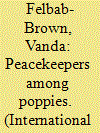

|
|
|
|
|
| Publication |
2009.
|
| Summary/Abstract |
This article analyses the role that the illicit narcotics economy has played in violent conflict in Afghanistan since the 1990s and the relationship between counter-narcotics and counter-insurgency policy in the country today. It details the evolution of the peacekeeping mission vis- -vis the narcotics economy, and the effects to date of the counter-narcotics policies that have been adopted since 2001. It argues that aggressive opium poppy eradication in Afghanistan today is premature and counterproductive with respect to counter-insurgency and stability objectives, as well as with respect to long-term economic development goals. The article concludes by providing policy recommendations on the role of peacekeeping forces with respect to illicit economies, arguing that the most important role peacekeeping forces have in tackling crime and reducing illicit economies is to provide security.
|
|
|
|
|
|
|
|
|
|
|
|
|
|
|
|
| 9 |
ID:
131287
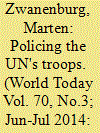

|
|
|
| 10 |
ID:
191042
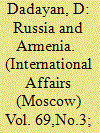

|
|
|
|
|
| Summary/Abstract |
THE unprecedented external challenges facing Russia today mean we must focus on not only the main front of these challenges but, considering their interconnectedness, other areas that have both functional and regional dimensions.
|
|
|
|
|
|
|
|
|
|
|
|
|
|
|
|
| 11 |
ID:
149126
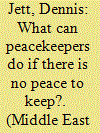

|
|
|
|
|
| Summary/Abstract |
They have a combined annual cost of $700 million, have been around for decades, are staffed by 14,000 soldiers and civilians and today do not seem to be accomplishing much of anything. What are they? The four peacekeeping operations (PKOs) in and around Israel. Put another way, why do all four of these operations continue to exist if there is currently so little peace to keep? There are a number of reasons for this paradox of peacekeeping, and an explanation requires taking a look at each of the four PKOs: the UN Truce Supervision Organization (UNTSO), the UN Disengagement Observer Force (UNDOF), the UN Interim Force in Lebanon (UNIFIL) and the Multilateral Force and Observers (MFO), which is not a UN operation.
|
|
|
|
|
|
|
|
|
|
|
|
|
|
|
|
| 12 |
ID:
137617
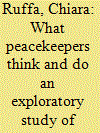

|
|
|
|
|
| Summary/Abstract |
This exploratory article points out how armies differ in the performance of their daily military activities during a peacekeeping mission and analyses the role of contrasting perceptions of the mission operational environment in explaining this variation. As a first step, this article documents systematic variations in the way French, Ghanaian, Italian, and Korean units implement the mandate of the UN mission in Lebanon in their daily military activity. Second, it shows that the four armies also interpret or “construct” the operational environment differently and in a way that is consistent with their different military behavior. Third, preliminary evidence suggests that previous experiences of each army influence the way in which the operational environment is constructed. Data were collected combining participant observation in Southern Lebanon with questionnaires and interviews. This article thus builds on sociological works on different operational styles but takes a methodological approach closer to that in security studies.
|
|
|
|
|
|
|
|
|
|
|
|
|
|
|
|
| 13 |
ID:
177857
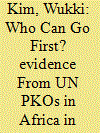

|
|
|
|
|
| Summary/Abstract |
The peacekeeping literature has primarily documented correlations between peacekeeping operations (PKOs) and their effectiveness or has focused on the decisions of troop-contributing countries participating in PKOs. Unlike the extant research, this paper shifts the focus to the decision-making process within PKOs. More specifically, this paper focuses on the timing of peacekeeper deployment by investigating how contributor leaders are distinguished from contributor followers. To tackle this topic, I use deployment-map data from 13 UN PKOs in Africa from 1990 to 2016. When a leader country deploys to a region before other countries, the followers will thus face an incentive to free ride because waiting to deploy to the region until it is secure is less risky. In short, there is a second-mover advantage that induces other countries to delay deployment until much later in a given UN PKO’s designated deployment window. This study finds that countries that could deploy more troops at their initial time of deployment and that have many previous UN PKO experiences are more likely to be leaders. Results also suggest that contributors engaging in multiple UN PKOs contemporaneously are less likely to be leaders.
|
|
|
|
|
|
|
|
|
|
|
|
|
|
|
|
|
|
|
|
|